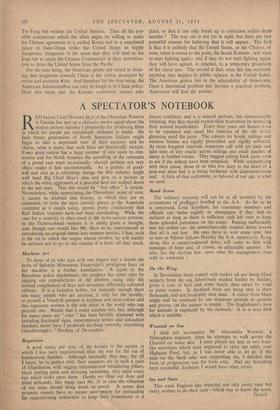Requisites A good ninety per cent. .of the houses in
the square in which I live were requisitioned after the war for the use of bombed-out families. Although internally they may, for all I know, be in perfect trim, their exteriors are in such a state of dilapidation, with sagging balconies and mouldering pillars, black peeling paint and decaying pediments, they repel every eye which looks upon them. Gently we close our door and tread delicately, like Agag, past No. 31 in case the vibration of our steps should bring down its porch. It seems that property owners have no means save prayer for persuading the requisitioning authorities to keep their possessions in a decent condition, and it is natural perhaps, but immeasurably irritating, that they should exploit-their frustration by hound ng their normal leaseholders. Every four years our houses h ive to be repainted and stand like bastions of the old order, gleaming amid the ruins. The colours for house, railings and window frames are rigidly prescribed and rigidly enforced. At more frequent intervals inspectors call with jot pads and take note of tiny cracks across ceilings and small patches of damp in lumber rooms. They suggest calling back quite soon to see if the defects have been remedied. While sympathising with their cause, those of us who live deep in the heart of a post-war slum feel it is being furthered with disproportionate zeal. A little of that uniformity, so beloved of our age, is what we need.


























 Previous page
Previous page